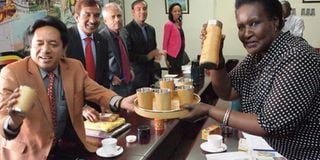Uganda, Bangladesh to sign trade deal

Former Trade minister Amelia Kyambadde (Right), hands over a gift of Bamboo products made in Uganda to Mr Quader Sarker (Left), the secretary to the government of Bangladesh in Kampala last week. PHOTO BY EPHRAIM KASOZI
What you need to know:
None. There has not been any trade relations between the two countries before.
Kampala. Plans for Uganda and Bangladesh to trade in textile and jute have been finalised, senior officials have said.
Officials said the two countries are set to sign a Memorandum of Understanding (MoU) to share information and technology on trade where Bangladesh will be extending its textile and jute products to the country.
Mr Mahmood Hudda, the Honourary Consul of Bangladesh in Uganda, said the exportation of jute products to Uganda is timely as the country moves from plastic packaging to biodegradable materials.
“The MoU has been presented to the Ministry of Internal Affairs for vetting of documents to formulate the bilateral trade. We are also looking at the Trade ministry to look into tax exemption on importation of jute to facilitate the trade on duty free basis,” Mr Hudda said over the weekend.
On taxing jute products, former Trade minister Amelia Kyambadde said it is an issue that will be considered in future since the country has undergone the budgeting process.
Mr Hudda, who led a delegation from Bangladesh for a meeting with the Ms Kyambadde, also revealed that Uganda will also be exporting rice to Bangladesh for food security.
“This is a long-term strategy because we want to encourage our private sector to extend expertise in Jute and textile production in Uganda to promote development,” he added.
Ms Kyambadde said the exportation of jute products to Uganda comes at a time when Uganda is phasing out the use of plastic materials for packaging because it will increase the importation of environment friendly materials.
“The trade relationship we are opening up is one way of expanding our potential and exposing people to new technologies and opportunities to do business,” said Ms Kyambadde.
Ms Kyambadde appealed to the public to utilise the opportunities to research and tap and into the new opportunities such as use of papyrus, bamboo and the various government initiatives for development.
Mr Quader Sarker, secretary to the government of Bangladesh, said they are working to fast-track the MoU for all sectors between the two countries.
“Our country does not produce cotton yet we do a lot of spinning that is why we are looking at countries like Uganda to provide us with material (cotton). We have come to exchange our ideas on business and trade because there are no direct links in terms of textile development,” said Mr Quader Sarker, the secretary to the government of Bangladesh.
The trade ties
There have not been any tangible trade relations between Uganda and Bangladesh. However, a number of Bangladeshi NGOs, such as BRAC, are operating in Uganda and have influential presence in the social development of the country.
Established in 2006, BRAC Uganda is engaged in microfinance, small enterprise, education, agriculture, livestock and poultry, health and adolescent empowerment in the country.




